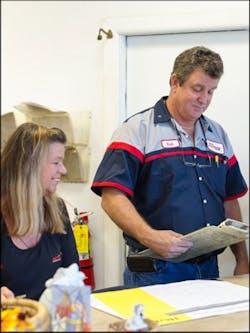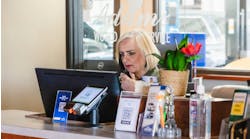Fueling the Future
Timing can make all the difference in business, and, for Nick Muhlenbruch, it would appear that, through no fault of his own, things were stacked up against him.
Muhlenbruch worked as a technician at Quality Automotive Center for six years before the previous owners approached him with an offer to purchase the business.
He jumped at the opportunity.
This was 2006, and the housing market was booming in Cape Coral, Fla., the Gulf-side, waterfront town just outside Fort Meyers where Quality Automotive had spent the last 16 years building its reputation and client base. Business was good, and the economy was even better. Muhlenbruch took over the shop with plenty of promise for growth and optimism for the financial security the shop would build for his family.
Then the housing market crashed a year later, and the economy started its swift decline into a recession. Just a couple years into ownership, Muhlenbruch was already at a crossroads.
Nick and Val Muhlenbruch
Quality Automotive Center
Cape Coral, Fla.
Size: 3,000 square feet
Staff: 2
Annual Revenue: $500,000
“It’s one of those things where everyone around us was hurting,” he says. “We could see it everyday in the shop. So, it’s hard to just worry about yourself.”
Muhlenbruch didn’t. Instead of using the economy as a crutch, another excuse for slumping sales, he decided to find purpose in it. Muhlenbruch has since built his business back to successful levels by focusing on a simple principle.
“Our business is supported by our community, so our focus should be on supporting our community,” he says matter-of-factly. “We live here. This is our community. We should be here to make it a better community to live in, for everyone.”
And Quality Automotive is doing its part: The shop donates 10 percent of gross profit (pretax) on every job to local Cape Coral schools.
Dollars and Sense
When Muhlenbruch and his wife, Val, took over Quality Automotive, they had three technicians and a manager working out of a new 3,000-square-foot facility.
Today, the Quality Automotive staff consists of only the husband-and-wife duo—concessions to the recession.
Still, with Muhlenbruch under the hood and Val at the front counter, the shop has kept relatively flat at $500,000 per year in revenue. That’s not the only dollar amount that has shaped the way the Muhlenbruchs do business, though.
Two years ago, Muhlenbruch offered to purchase school supplies for his two grandchildren. They went to the store and loaded up on everything their schools required: backpacks, pencils, highlighters, rulers—everything added up to a bill of more than $300.
“I was just floored,” Muhlenbruch, 51, says. “Our youngest kid graduated high school in 2007, so it’d been a while since we had to do this for an elementary school–aged kid. We didn’t realize the cost of this nowadays.”
And it made the Muhlenbruchs consider the school system as a whole: “If it’s just this much for each family, imagine the cost of the schools providing students with what they need, not to mention activities.”
This was the moment that the Fuel for School campaign was born. The Muhlenbruchs created a fund through the Cape Coral Community Foundation, and made a pledge to donate a portion from each sale.
Making it Work
Muhlenbruch isn’t a first-time shop owner, and this isn’t his first foray into community involvement. He owned a small shop in New York, where he was also a volunteer fireman and high school athletics coach, before the family moved to Florida.
From the first day he took over Quality Automotive, Muhlenbruch has had promotions with local food banks ($2 off any service if a customer brings in nonperishable canned food) and blood donation centers (four blood donations gets a customer a free oil change).
He knew to be able to pull off a program like he envisioned for Fuel for School, his business needed to be sound first.
“I looked at it as a marketing campaign, really,” he says, describing his assessment process. “That’s not the reason we wanted to do it, but it’s the way it fits into the business. It’s an investment in the community, but also into our marketing the shop and bringing in more customers. Ten percent is a big chunk, but looking at the numbers, the program should do well enough to increase car count, and more than make up for it.”
Muhlenbruch also says that he settled on 10 percent because it was an easily calculable amount for customers. (“They could do the math and know just how much is going into the fund,” he says.)
And that’s part of what’s appealing to customers, Muhlenbruch says. Customers aren’t paying any extra money to help the local schools; it’s all coming out Muhlenbruch’s take on the work. The fund is set up in a way that the Muhlenbruchs automatically withdraw 10 percent from each sale and put it into the account. Customers get to choose a school in the area the money from their repair will go to, and when a significant enough amount of cash has been saved for a particular school, the Muhlenbruchs cut the check.
In August, they wrote a check to Trafalgar Middle School for $409.
Fuel for School is just a little more than a year old now. It took some time to get up and running, and Muhlenbruch says it’s still “in its infancy.”
Yet, as Cape Coral’s economy and housing market continue to improve, he’s seen it pay off in the shop. The area is growing again. Business is growing again. Muhlenbruch is getting ready to hire a technician in the coming months, and he says customers are more willing to purchase repairs, especially with the added bonus of helping the community’s schools.
“Our focus is really two fold, because we want our business to keep growing and, in turn, that will help, in a small way, our schools,” he says. “Anyone can donate to the fund; it doesn’t have to come through us. And we’re hoping other businesses get involved.
“We need to support our communities. After the last few years we’ve had all around the country, the timing is perfect to jump in and help.”
Minivan Makeover
This year, Mike Buckridge sought help. He asked everyone involved—the body shop that did the cosmetic work, the stereo store that put in the sound system, the radio and TV stations that helped promote it. Everyone came to one of Buckridge’s Sun Automotive locations and helped him sort through the piles of applications.
“That’s the hardest part,” he says, “just picking a winner. When you’re giving away a car, one that you put a lot of effort into, you want to make sure it’s really going to someone who needs it and deserves it.”
In 2012, that was a family that had to drive from Portland to Seattle for one of its four children to receive regular medical treatment.
And, in its simplest form, that’s Duck My Ride: Buckrdige and his three-shop Sun Automotive team buy, rebuild and refinish a vehicle for a family in the Eugene, Ore., area each year. The car is presented in mid-September.
So far, it’s been a minivan each time—and it has featured green and bright yellow colors in honor of the nearby University of Oregon; hence the name Duck My Ride. (Originally, it was called Duck My Truck, Buckrdige says with a laugh, but they soon realized they weren’t going to give out trucks and changed the name.)
Mike and Sherrie Buckridge
Sun Automotive
Three shops in Eugene, Ore., area
Size: 4,000–4,500 square feet
Staff: 18–20 total (depends on season)
Annual Revenue: $2.5 million total
The program started in 2011, as the shop was approaching its 35th anniversary. Buckridge says he and his wife, Sherrie, were looking to do something to give back to the area that helped support them for so long.
They came up with the idea for Duck My Ride, and also put together a “35 Acts of Kindness” campaign, in which each location has worked to donate money, raise funds, or volunteer time or services to local familes in need.
The “35 Acts” filled up quickly; Buckridge and his team have always had an emphasis on community involvement. The Duck My Ride program took more work to put together.
Buckridge says there are a number of steps to take to set up a similar program:
1. Find Partners. Often, there will be neighboring businesses that are willing to chip in work, whether it’s a collision business offering to remove dents or spray paint, or a radio station agreeing to promote the program. This also serves as great networking for your business, Buckrdige says.
2. Set Goals and Limits. Buckridge says his shop normally spends $4,000–$5,000 on the vehicle, and another $4,000 or so fixing it. You need to understand how much money—and time—you can put into the project. Also, set a realistic goal date for completion. Buckridge’s team does 90 percent of the work on each vehicle, so they need the time to complete the work properly without adversely affecting the shop.
3. Market. “I’d like to say this is all just out of the goodness of our hearts, but we obviously know that it helps our reputation,” he says. So, make sure people know about it. That’s why partnering with local media on the project, exchanging airtime or ad space for attaching their name to the campaign, allows you to get free publicity for your shop and the program.
Lending a Hand
Mike Personius’ shop, Chunk’s Automotive Service, is in Long Lake, Minn., a small lake town that sits a solid 30-minute drive west of Minneapolis.
“We’re in an awkward spot to where everyone to the west of us thinks we’re a city shop and everyone to the east thinks we’re in the boonies,” he says.
But when he bought Chunk’s 20 years ago (and held onto its unique name), Personius had a goal to firmly position his shop as one his community could easily identify with.
And to do it, he decided to give away his work for free—well, at least for a day.
Every Thanksgiving, 100 percent of sales go to Minneapolis-based Sharing and Caring Hands, an organization that provides the poor with everything from food to clothes to shelter.
The event has helped grow the business’s support in the community, and, today, the 3,000-square-foot shop is running at capacity, generating more than $500,000 in sales each year with just three people on staff.
Mike and Julie Personius
Chunk’s Automotive Service
Long Lake, Minn.
Size: 3,000 square feet
Staff: 3
Annual Revenue: $500,000
“It’s really just a fun day,” Personius says. “It gets people in the area excited, and it’s nice for us to be able to help out people in our area.”
The shop has branched out into some more events, as well. Among those is a three-day special around Valentine’s Day where the sales from every oil change and tire rotation go to a local charity.
Personius says he has a couple of tips for other shops to make sure they capitalize on their community-based marketing campaigns:
Tip No. 1: Inspections are the moneymaker. Giving away free work doesn’t help the bottom line, but, if your shop is doing complete vehicle inspections on each car that comes in, you’re going to be able to get additional jobs with each customer—revenue you wouldn’t have had without the promotion.
Tip No. 2: Do what you’re passionate about. Personius is quick to give his wife, Julie, credit for the successful Thanksgiving campaign. However, his involvement as the head coach for the local junior high and high school track shooting team was all about his passion for the sport.
He now has 40 kids on his team, who all either drive or have parents that drive vehicles. It’s not the reason he volunteered, but it’s another way for his business to be out in front of the community.



